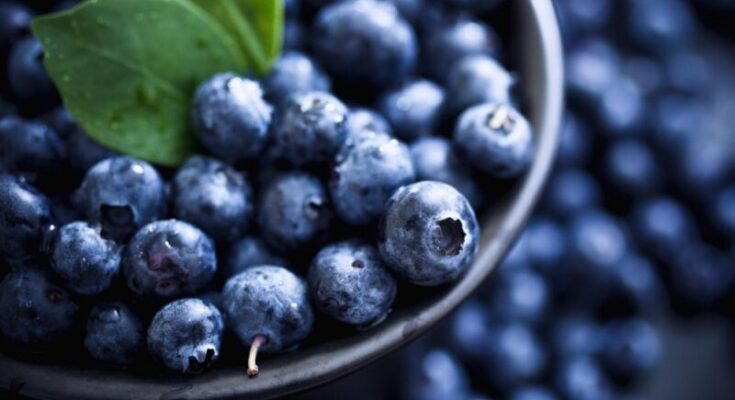Everything you need about wellhealthorganic.com:blueberry-brain-boosting-benefits
Blueberries can be eaten fresh or in a variety recipes. You can also buy them frozen.
They are proven to be protective against heart disease, cancer, and may also aid in maintaining bone strength, mental well-being, and healthy blood pressure.
Also Read: wellhealthorganic.com:ayurveda-dinner
Quick facts about blueberries
- Anthocyanin is a plant compound found in blueberries. This is what gives blueberries their blue color as well as many health benefits.
- Blueberries are good for your heart, bones, skin, mental, and blood health.
- Blueberries provide 24 percent of the daily recommended intake of vitamin C. One cup of blueberries contains 24%.
- Blueberries can be used to top waffles or pancakes, yogurt, oatmeal or cereals. You can also blend them in a smoothie, syrup or make muffins or sweet breads with them.
- Patients who take blood-thinners such as warfarin should consult their doctor before increasing their blueberry intake. The high vitamin K content could cause blood clotting problems.
Benefits
Blueberries have many health benefits thanks to anthocyanin, a type of flavonoid. Plant compounds called flavonoids often have powerful antioxidant effects.
Blueberry’s distinctive blue color is due to anthocyanin. Blueberries also have many benefits thanks to anthocyanin.
A variety of fruits, vegetables and healthy lifestyle choices have been linked to a lower risk of developing many health conditions.
Numerous studies have shown that a higher intake of blueberries and other plant foods can reduce the likelihood of developing diabetes, obesity, heart disease, or overall mortality. The health of hair and skin, as well as increased energy and a lower overall weight, may be aided by plant foods.
Experts often discuss freezing blueberries. Experts often mention that freezing blueberries can reduce the blueberry’s potency and health benefits. According to a studyTrusted Source, over 6 months of storage, the anthocyanin was reduced by 59 percent.
This is not confirmed and different sources have different opinions on whether freezing blueberries has any effect on their health. If in doubt, purchase fresh, organic blueberries.
While more research is required, it’s clear that blueberries have strong links to many aspects of healthy living.
Also Read: Wellhealthorganic.Com:10-Benefits-Of-Eating-Roasted-Gram
Maintaining healthy bones
Blueberries are rich in iron, phosphorous and calcium. They also contain manganese, zinc and vitamin K. The proper intake of vitamins and minerals is important for building and maintaining strong bones.
Trusted Source plays a crucial role in maintaining bone strength and joint elasticity.
A lower intake of vitamin K has been associated with a higher chance of breaking bonesTrusted Source. A good intake of vitamin K can improve calcium absorption and reduce calcium loss.
Skin health
Collagen is the skin’s support system. Collagen is dependent on vitamin C, which helps prevent skin damage from the sun, smoke, and pollution. Vitamin C can also help improve collagen’s ability smoothen wrinkles and texture overall.
Blueberries provide 24 percent of the daily recommended intake of vitamin C.
Lowering blood pressure
To maintain healthy blood pressure, it is important to keep sodium levels low. Blueberries contain no sodium.
They are rich in potassium, calcium, magnesium, and other minerals. Studies have shown that a low intake of these minerals is associated with higher blood pressure. According to Trusted Source, a healthy diet with enough minerals can help lower blood pressure.
These findings have been refuted by other studies. A 2015 study Trusted Source by people with metabolic syndrome showed that blueberry consumption for six weeks did not impact blood pressure.
Also Read: wellhealthorganic.com:health-hazards-of-prolonged-sitting
Managing diabetes
Studies show that type 1 diabetics who eat high-fiber diets have lower blood glucose levels than those who eat low-fiber diets. Type 2 diabetes sufferers who eat the same foods may experience higher blood sugar, lipid and insulin levels. A cup of blueberries contains 3.6 grams (g), of fiber.
A large cohort studyTrusted Source, published in the BMJ in 2013, suggested that certain fruits could lower the risk of developing type 2 diabetes in adults.
The study found that 6.5 percent of participants were diagnosed with diabetes during the course of the experiment. The researchers found that eating three meals per week of blueberries and grapes, raisins or apples, reduced the risk of developing type 2 diabetes by 7 percentage points.
Heart disease prevention
Blueberries are rich in fiber, potassium and folate which support heart health. Blueberries are low in cholesterol, which is good for the heart. The fiber content in blueberries helps reduce cholesterol levels and lowers the risk of developing heart disease.
Homocysteine is prevented by vitamin B6 and folate. Homocysteine buildup in excess can cause damage to blood vessels and heart problems.
A Harvard School of Public Health study and the University of East Anglia found that regular intake of anthocyanins in the United Kingdom can lower the risk of developing heart disease by 32 percent. This is true for both young and middle-aged women.
According to the study, women who ate at least three blueberries per week had the best results.
Also Read: Wellhealthorganic.com:12-effective-weight-lose-tips-without-dieting
Prevention of cancer
Blueberries contain vitamin C, vitamin A, as well as various phytonutrients, which act as powerful antioxidants to protect cells from damage caused by disease-linked free radicals.
Antioxidants may be able to inhibit the growth of tumors, reduce inflammation, and help prevent or slow down colon, prostate, endometrial and pancreatic cancers.
Folate, also found in blueberries, plays an important role in DNA synthesis. Folate can help prevent cancer cells from formingTrusted Source.
Mental health improvement
Studies conducted in the population have shown that blueberries are associated with slower cognitive declineTrusted Source in older ladies.
Research has also shown that blueberries may not only reduce the risk of cognitive harm, but can also help improve short-term memoryTrustedSource and motor coordination.
Nutrition
One cup of fresh blueberries comes withTrusted Source
- 84 calories
- Cholesterol: 0 g
- 1.11 g protein
- 0.49 g fat
- 21.45g carbohydrate
- 3.6 grams of dietary fiber
- 14.74 g total sugars
The same cup serves:
- Vitamin C daily intake of 24 percent
- 5 percent daily vitamin B6
- 36 percent of the daily vitamin K intake
Also, blueberries provide:
- 9 mg (mg) Calcium
- 0.41 mg iron
- 114 mg potassium
- 9 mg magnesium
- 18 mg of phosphorous
- 1 mg sodium
- 0.24 mg of zinc
- 9 mg folate
Blueberries contain also copper, beta-carotene and folate. Vitamins A and E are also found in blueberries.
Blueberries are rich in anthocyanins and vitamins. These compounds contribute to blueberry’s antioxidant potential.
Blueberries are high up on the Aggregate Nutrition Density Index (ANDI) because of their large amounts of bioactive chemicals. This index ranks foods according to their vitamin and mineral content, as well as their phytochemical composition and antioxidant potential.
The highest ranking foods have the most nutrients per calorie. Blueberries, which have an ANDI score of 132, are among the top fruits or vegetables in terms of nutrient density.
ANDI is just one of many rating systems for food nutrition. However, further research is required to identify the role of specific foods in disease prevention.
Diet
Blueberries can be purchased fresh, frozen, or freeze dried. They also come in syrups, jelly, syrups, jams, and jellies. For added sugars, make sure you check the labels of frozen and dried blueberries. Choose all-fruit jams and jellies that are free of sweeteners, juices, and fillers when choosing jelly or jams.
Here are some quick tips for including blueberries into your meal plans:
- Blueberries can be used as toppings for oatmeal, waffles and pancakes.
- Make a quick smoothie with frozen berries, low fat milk, and yogurt.
- Make a spinach salad using fresh or dried blueberries and walnuts with feta cheese.
- Blueberries can be used to make muffins or sweet breads.
- Combine them with a small amount of water in a food processor. Use this as a topping for desserts and breakfast foods.
Source: Wellhealthorganic.com:12-effective-weight-lose-tips-without-dieting




